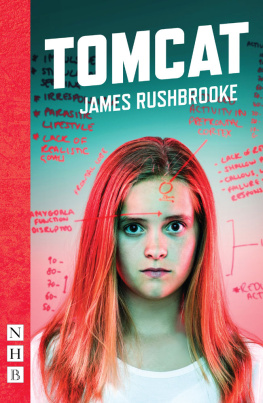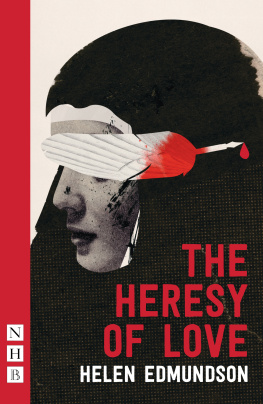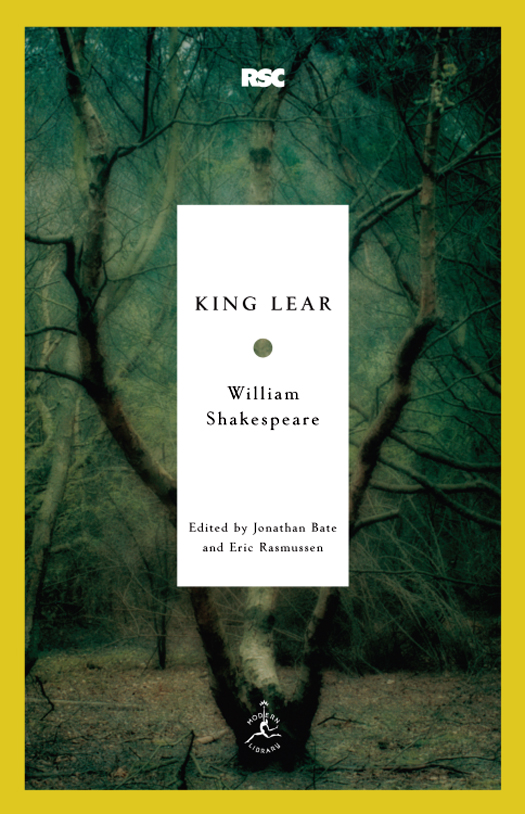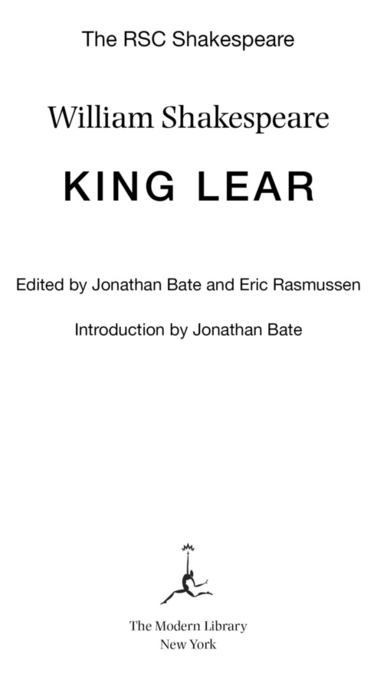The RSC Shakespeare Edited by Jonathan Bate and Eric Rasmussen
Chief Associate Editor: Hlose Snchal
Associate Editors: Trey Jansen, Eleanor Lowe, Lucy Munro,
Dee Anna Phares, Jan Sewell
King Lear Textual editing: Eric Rasmussen and Trey Jansen
Introduction and Shakespeares Career in the Theater: Jonathan Bate
Commentary: Penelope Freedman and Hlose Snchal
Scene-by-Scene Analysis: Esme Miskimmin
In Performance: Karin Brown (RSC stagings), Jan Sewell (overview),
Jonathan Bate (captions)
The Directors Cut (interviews by Jonathan Bate and Kevin Wright):
Adrian Noble, Deborah Warner, Trevor Nunn
Editorial Advisory Board Gregory Doran, Chief Associate Director,
Royal Shakespeare Company
Jim Davis, Professor of Theatre Studies, University of Warwick, UK
Charles Edelman, Senior Lecturer, Edith Cowan University,
Western Australia
Lukas Erne, Professor of Modern English Literature,
Universit de Genve, Switzerland
Jacqui OHanlon, Director of Education, Royal Shakespeare Company
Akiko Kusunoki, Tokyo Womans Christian University, Japan
Ron Rosenbaum, author and journalist, New York, USA
James Shapiro, Professor of English and Comparative Literature,
Columbia University, USA
Tiffany Stern, Professor and Tutor in English, University of Oxford, UK
2009 Modern Library Paperback Edition Copyright 2007, 2009 by The Royal Shakespeare Company Interview responses by Deborah Warner in Directors Cut
copyright 2009 by Deborah Warner All rights reserved. Published in the United States by Modern Library, an imprint of The
Random House Publishing Group, a division of
Random House, Inc., New York. M ODERN L IBRARY and the T ORCHBEARER Design are registered trademarks
of Random House, Inc. Royal Shakespeare Company, RSC, and the RSC logo are trademarks or registered trademarks of The Royal Shakespeare Company. The version of
King Lear and the corresponding footnotes that appear in this volume were originally published in
William Shakespeare Complete Works, edited by Jonathan Bate and Eric Rasmussen, published in 2007 by Modern Library, an imprint of The Random House Publishing Group, a division of Random House, Inc. eISBN: 978-1-58836-828-7 www.modernlibrary.com v3.1_r1
CONTENTS
INTRODUCTION
AN OLD MAN TOTTERING ABOUT THE STAGE?
King Lear, wrote the early nineteenth-century Romantic poet Percy Bysshe Shelley in his
Defence of Poetry, may be judged to be the most perfect specimen of the dramatic art existing in the world.
For all the Romantics, Lear was Shakespeares most sublime and universal play. John Keats wrote a sonnet On sitting down to read King Lear once again: having burned his way through the play, he would feel somehow purified and regenerated. For Keats contemporary Charles Lamb, Shakespeares anatomy of the human condition was so profound and tempestuous that the play seemed too vast for the stage. It is the centerpiece of his essay On the tragedies of Shakspeare, considered with reference to their fitness for stage representation: So to see Lear acted,to see an old man tottering about the stage with a walking-stick, turned out of doors by his daughters in a rainy night, has nothing in it but what is painful and disgusting. We want to take him into shelter and relieve him. That is all the feeling which the acting of Lear ever produced in me.
But the Lear of Shakspeare cannot be acted. The contemptible machinery by which they mimic the storm which he goes out in, is not more inadequate to represent the horrors of the real elements, than any actor can be to represent Lear: they might more easily propose to personate the Satan of Milton upon a stage, or one of Michael Angelos terrible figures. The greatness of Lear is not in corporal dimension, but in intellectual: the explosions of his passion are terrible as a volcano: they are storms turning up and disclosing to the bottom that sea his mind, with all its vast riches. It is his mind which is laid bare. This case of flesh and blood seems too insignificant to be thought on; even as he himself neglects it. On the stage we see nothing but corporal infirmities and weakness, the impotence of rage; while we read it, we see not Lear, but we are Lear,we are in his mind, we are sustained by a grandeur which baffles the malice of daughters and storms; in the aberrations of his reason, we discover a mighty irregular power of reasoning, immethodized from the ordinary purposes of life, but exerting its powers, as the wind blows where it listeth, at will upon the corruptions and abuses of mankind.
What have looks, or tones, to do with that sublime identification of his age with that of the Heavens themselves, when in his reproaches to them for conniving at the injustice of his children, he reminds them that they themselves are old. What gestures shall we appropriate to this? What has the voice or the eye to do with such things? For Lamb, the technical necessities of the theaterthe backstage machinery that creates the storm, the actors repertoire of gestures, looks, and vocal variationsare exterior and superficial distractions from the plays inward and remorseless exploration of reason and madness, humankind and nature, the corruptions and abuses of power. Few theater lovers would agree with Lamb, but few would deny that the role of Lear presents perhaps the greatest of all challenges to the Shakespearean actor. There is a theater saying that by the time youre old enough to play it, you are too old to play it. A generation before the Romantics, Dr. Samuel Johnson confessed that even reading the play was almost too much to bear: I was many years ago so shocked by Cordelias death, that I know not whether I ever endured to read again the last scenes of the play till I undertook to revise them as an editor.
The shock for Johnson was both emotional and moral. The death of CordeliaShakespeares boldest alteration of his sources, in all of which she surviveswas an extraordinary breach of the principal that Johnson called poetical justice, whereby a play in which the wicked prosper, and the virtuous miscarry, may doubtless be good, because it is a just representation of the common events of human life: but since all reasonable beings naturally love justice, I cannot easily be persuaded, that the observation of justice makes a play worse; or, that if other excellencies are equal, the audience will not always rise better pleased from the final triumph of persecuted virtue. It had been in order to impose poetical justice on the play that during the 1680s Nahum Tate, author of the hymn While Shepherds Watched Their Flocks by Night, had rewritten King Lear with a happy ending, in which Cordelia was married off to Edgar. Johnson had some sympathy with this alteration, which held the stage for a century and a half, whereas for Lamb it was yet one more indication that the theater was not to be trusted with Shakespeares sublime vision of universal despair.
THE DIVISION OF THE KINGDOM
Written soon after King James united the thrones of England and Scotland, and performed in his royal presence at Whitehall,
King Lear reveals the dire consequences of dividing a united kingdom. In principle, the aged Lears decision to take voluntary retirement does not seem a bad thing: he is losing his grip on matters of state, his daughters and sons-in-law are younger strengths with more energy for government, and, most important, the division is intended to prevent a future civil war between rival claimants, which would have been a definite possibility in the absence of a son who would automatically inherit the whole kingdom.





